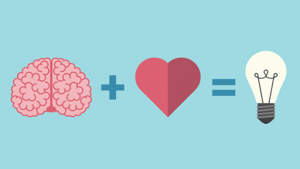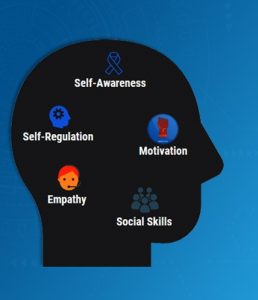What is Emotional Intelligence? Put your reading glasses on and scroll through this piece to know what is Emotional Intelligence actually and incorporate it in your life for good. You will get a better insight into the power of emotions that enrich your life when used intelligently.
Imagine, your friend is angry or your colleague is feeling depressed but you couldn’t understand it. How would the situation be? But thankfully, we understand such emotions and respond accordingly. This ability is referred to as emotional intelligence by psychologists. It is considered to be much more emotionally intelligent to thrive in life. Let’s know more about it.
What is Emotional Intelligence?
Emotional Intelligence, also known as emotional quotient or EQ is the ability to understand, use, and manage emotions effectively and positively. EQ helps us understand the intention, purpose, and independence of our lives. The fact of how emotionally intelligent we are rules our behavior and relationships, and eventually the quality of our life.
Some researchers opine that emotional intelligence can be learned, while others claim it to be an inborn characteristic.
What is the Difference between IQ and EQ?

IQ (Intelligence Quotient) evaluates how smart you are at using logic, grasping or communicating complex ideas, and solving problems.
On the other hand, EQ tests how good you are at recognizing emotions, both yours as well as others. And utilize this awareness to take apt decisions. Those having a high EQ can reduce stress, anxiety, enhance relationships, resolve conflicts, empathize with others, communicate better, and conquer life’s challenges.
Suggested Reading: How to Conquer Fear and Self-Doubt
Importance of Emotional Intelligence

We can start our way to a contented life with Emotional intelligence (EI). All we need to do is to apply intelligence to emotional responses. This helps us know how logically consistent or inconsistent these responses are. It was there since the beginning of times, but with its recognition as a psychological aspect, EI is a breakthrough that needs to be embedded in us for all good reasons.
Now coming to the query – what is emotional intelligence in psychology?
Coined first by psychologists Mayer and Salovey (1990), EI comprises four branches:
- The ability to perceive emotions in oneself and others accurately
- The ability to use emotions to facilitate thinking
- The ability to understand emotions, emotional language
- The signals conveyed by emotions
In 1995 Goleman recognized five distinct skill categories that form the key characteristics of EI and proposed that, unlike one’s intelligence quotient (IQ), these categorical skills can be learned where absent and improved upon where present.
Now coming to the point, why is emotional intelligence important? With the evolution of the workplace, the teams are required to be equipped with higher EI. This enables them to work cohesively, effectively adapt to changes, manage stress, and be more efficient at pursuing business objectives.
Therefore, EI is your psyche’s dynamic aspect. It involves behavioral traits that result in immense benefits, ranging from well-being and happiness to a successful career graph.
How to Use Emotional Intelligence in Everyday Life?

Everyone goes through huge doses of stress these days but how to handle those makes all the difference. As it is famous – Emotional Intelligence is the newest predictor of highly successful people. They are emotionally balanced, in sync with their intuition, and can wonderfully listen and empathize with others. They can also solve problems constructively.
Here are some emotional intelligence examples from your daily routines to heighten your EQ:
- Give gratitude: Showing gratitude daily is miraculous! You see and appreciate what’s good in your life, rather than holding on to what is not.
- Manage your stress: Once you learn to handle your emotions during stress and stay calm, you can control your decisions. Your way of handling stress makes you a different person – assertive or negative.
- Reflect on your day: Reflecting daily helps you assess your strengths and weaknesses.
- Observe people around you: You understand people’s nature and know the best way to stay connected. Considering the fact that people are different from each other, you know how to engage everyone.
- Encourage criticism: EQ makes you find criticism valuable. You stay open to it and draw constructive points for your betterment from it.
- Breathe before speaking: This gives you a short pause before responding to someone. It shows that you were attentively listening, processing your thoughts, and then answer.
- Assume the best: Everyone on earth is trying to be the best. This outlook prompts an immediate compassion shift where you lend an ear and connect better with people who are doing everything in their might to improve.
- Look for meaning: Try to find meaning in the way people react. It might be puzzling at the moment but if you ponder upon it, the answer might be clear to you.
- Disagree respectfully: If you are not in unison with someone’s thoughts, ideas, or approaches; try to understand how he/she would like to be responded to. Make sure you are providing a solution to him/her or highlighting a flaw.
What are the Components of Emotional Intelligence?
As per researchers, the following are the different levels of emotional intelligence –
- Emotional Perception: Perceiving emotions accurately is a crucial step here. Many a time, you have to perceive emotions only through cues like facial expressions and body language.
- Reasoning with Emotions: Emotions help us prioritize where we should be attentive and react. We respond emotionally to what catches our attention. In short, using emotions help us to promote thinking and cognitive activity.
- Understanding Emotions: Our emotions have varied meanings. If someone is being aloof, we should find the reason for it and what is its meaning. For instance, if your friend is acting distant for some time, it might be because you have hurt him/her or he/she is dealing with some personal issues.
- Managing Emotions: Another vital part of emotional intelligence is managing emotions. Having control of your emotions and knowing how to respond to others’ emotions is an integral part of EQ.
What are the Characteristics of Emotional Intelligence?

Emotional Intelligence is the new smart that needs to be applied today. However, if it is applied to leadership, the concerned people will be set on a path to professional success. Additionally, the workplaces will become better for several reasons. Here are the characteristic qualities of Emotional Intelligence that improve you from within, take you the pinnacle of success, while contributing to others.
- Self-awareness: Know yourself. This will take you to self-awareness and you will be more alert of your strengths, weaknesses, and desires. Being self-aware helps you take better decisions while being aware of the way their emotions and actions impact them and others. It also affects their career performance.
- Self-regulation: Self-regulation and discipline help people to stay calm in situations that can draw them, impulsive. Professionals who ponder on a tough situation, let go of errors easily, whether their or their team’s. They set healthy boundaries and value their commitments. So, if the question – what is emotional intelligence in the workplace pops in your head, know that with self-regulation leaders can smartly react to, embrace, adapt to change, and be beneficiated at work.
- Empathy: It is all about being aware and considerate of others’ feelings. Empathic leaders win clients’, team members’, and colleagues’ trust and build good bonds with them. This,
- in turn, boosts employee loyalty. Empathy helps avoid misunderstandings and is instrumental in understanding new work culture and environment
- Motivation: Emotionally intelligent people are passionate to achieve goals and motivate others for the same. In a work environment, motivation makes people invest their best efforts no matter how challenging the situation is. They try to get a clear idea of the task and new approaches to complete it while making themselves better and helping others.
- Social skills: These are a must for a professional culture. Social skills are not just about being friendly with people around you but also understand them, develop relationships, and motivate them.
How to Improve Emotional Intelligence?

It is important to be emotionally intelligent. However, you can also polish your emotional ad social skills with these tips for improving emotional intelligence –
Listen: To understand the feelings of others, listening to them is crucial. Pay attention and see what they want to convey, whether verbally or through body language. The latter also speaks a lot. When you feel someone is going through an emotional phase, you consider different aspects that have led to those emotions.
Empathize: Understanding how others feel and trying to step into their situation are two different things. To empathize, you need to do both. Imagine their situation with yourself. Later, you can develop stronger emotional skills.
Reflect: Emotions with reason are a vital part of emotional intelligence. See how your emotions impact your behavior and decisions. While thinking about the way others respond, evaluate how their emotions overtake them. Consider if there is anything unseen that is making the person feel that way.





